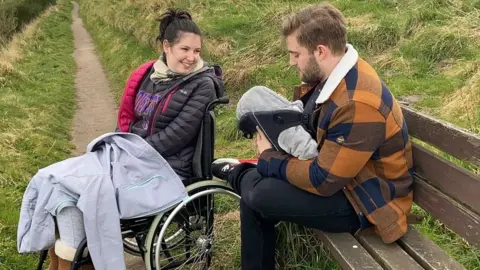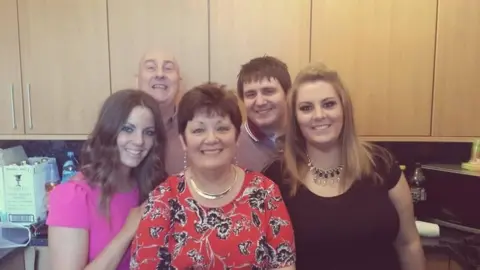Charity says housing system fails people with MND
 Lucy Lintott
Lucy LintottPeople with motor neurone disease (MND) have been failed by the housing system, a charity has said.
Those living with the terminal condition have reduced mobility and require homes with easy access.
MND Scotland said some waiting times for suitable housing or alterations were longer than the average life expectancy of someone with the disease.
The Scottish government said it was looking at how to streamline the process to help make changes easier.
People living with MND can quickly lose their ability to walk, talk, eat and breathe unaided. The disease gets worse over time.
The call for improvements to the housing system has been backed by people affected by the illness, including 27-year-old Moray mum Lucy Lintott.
She said she had been told her new accessible home would not be available until next year.
MND Scotland said the current processes were not working well, with too few accessible homes and long waits for allocations or home adaptations.
Head of policy and campaigns, Susan Webster, said: "Speed with MND is key.
"One local authority reported a waiting time of four years for an accessible home, and another reported it could take 15 months, from being added to the waiting list, to having a ramp fitted.
"The average life expectancy of someone with MND is just 18 months from diagnosis."

Precious months 'spent frustrated and stressed out'
Former police officer and ambulance service worker Ian Cartwright died in October 2019, less than a year after his diagnosis with MND.
His wife Marie said she spent the last months of his life fighting North Lanarkshire Council to get a wet room and other essential adaptations installed.
She said she had to wash him on their garden decking with buckets of water because her husband's difficulties accessing their bathroom.
Mr Cartwright died before adaptations were put in place.
His wife said: "My husband Ian only lived for nine and a half months from diagnosis. That was precious time that we were supposed to spend making memories together.
"Instead, we spent most of it frustrated and stressed out, battling to get adaptations made to our home."
 Marie Cartwright
Marie CartwrightShe praised the help received from an occupational therapist, but said the process was delayed by committee meetings and there were also difficulties in finding builders to do the work.
North Lanarkshire Council said it spent £3m annually carrying out works to specially adapt council properties for people and families who require additional support around their homes including ramps, widened doorways, grip rails, walk in showers, wet rooms, stairlifts and changes to room layouts.
A spokesman said: "We liaise with families to discuss and review their needs and aim to support them as quickly as possible.
"We also work with our tenants and the health and social care partnership to put in place the most appropriate home adaptations for those who need additional assistance."
The council also aims to provide 5,000 new-build homes for rent by 2035, with a number of properties on each site designed to suit tenants' varying needs, he added.

Ms Lintott, who was diagnosed with MND in 2014, lives in a two-bedroom sheltered accommodation flat in the Elgin area with her partner Tommy and their two young children.
She has been on a list for a three-bedroom accessible home for more than a year.
Ms Lintott said: "I got offered a two-bed bungalow but had to turn it down as it was smaller than my flat and I need a third bedroom for overnight care.
"I have two young kids, who are only going to get bigger and take up more space around the flat. It's just not realistic to stay where I am for much longer."
Her local authority, Moray Council, said it had policies in place to support people with terminal illnesses and increase the availability of suitable housing.
It said private developments of 10 or more homes must include affordable housing and provide 10% of the units to wheelchair accessible standards.
Over the last 10 years, in line with Scottish government guidance, the council said it had worked with housing association partners to deliver 140 wheelchair accessible homes.
A spokeswoman said: "We make strenuous efforts to identify the needs of wheelchair users who apply for assistance and aim to deliver housing with sufficient internal circulation space to meet their needs, and which can also be tailored to the individual."
The Scottish government said it wanted people with degenerative illnesses such as MND to have "choice, dignity and freedom" to access suitable homes.
It said wherever possible all new affordable homes were designed to be flexible to meet people's needs as they change over time.
A spokesman said: "However, we know there are issues with the way adaptations are being accessed and delivered locally.
"We are looking at how the process can be streamlined and made easier for people who need adaptations."
He added: "We are also working to increase the supply of accessible and adapted homes, bringing in a new Scottish Accessible Homes standard that all new homes must meet and delivering a programme to retrofit homes in the social rented sector to make them accessible."
